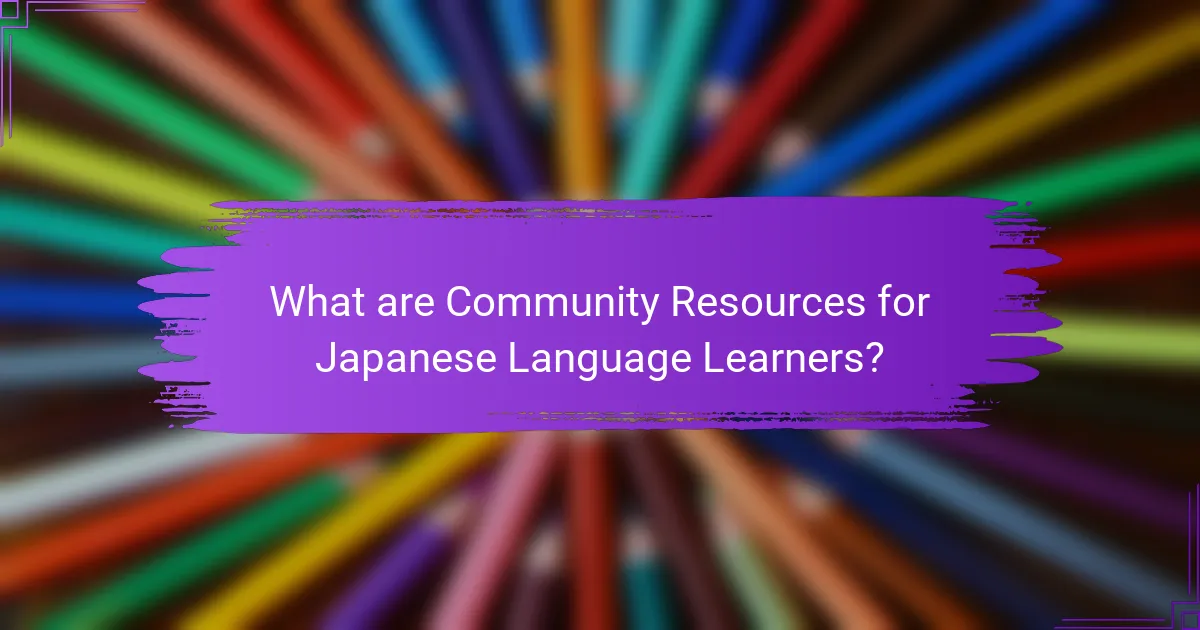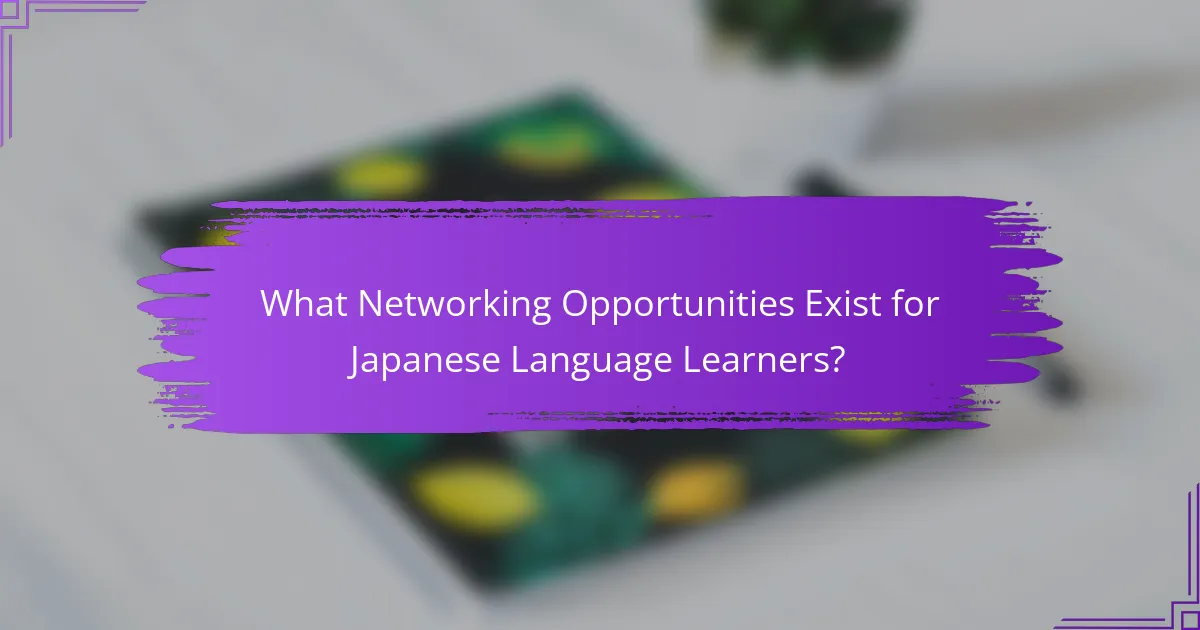
What are Community Resources for Japanese Language Learners?
Community resources for Japanese language learners include language exchange programs, community classes, and cultural organizations. These resources provide learners with opportunities to practice speaking and improve their language skills. Many local libraries offer free or low-cost Japanese language courses. Community centers often host cultural events that promote language learning. Social media groups can connect learners with native speakers for informal conversations. Japanese cultural festivals also serve as networking opportunities for learners. Local universities may provide resources such as conversation partners and tutoring services. These resources enhance the learning experience by fostering community engagement and cultural understanding.
How can these resources support language acquisition?
Community resources can significantly support language acquisition for Japanese learners. These resources provide access to native speakers, enhancing conversational skills. Networking opportunities create environments for practice and immersion. Event listings promote participation in cultural activities, reinforcing language use in context. Studies show that social interaction boosts language retention and fluency. Engaging with community members fosters motivation and accountability. Moreover, exposure to authentic materials aids comprehension and vocabulary development. Therefore, these resources are vital for effective language learning.
What types of resources are available for learners?
Learners have access to various resources, including online courses, textbooks, and community events. Online courses provide structured lessons and interactive content. Textbooks offer comprehensive language instruction and practice exercises. Community events, such as language exchange meetups, facilitate real-life practice and networking. Additionally, learners can utilize language apps for on-the-go practice. Social media groups also serve as platforms for sharing resources and connecting with other learners. These resources collectively enhance the learning experience and provide support.
How do these resources cater to different learning styles?
These resources cater to different learning styles by offering diverse formats and interactive opportunities. Visual learners benefit from video tutorials and infographics. Auditory learners engage with podcasts and discussion groups. Kinesthetic learners participate in hands-on workshops and cultural events. These varied approaches accommodate individual preferences and enhance language acquisition. Research supports that multi-modal learning improves retention and understanding. Studies indicate that learners who engage with content through multiple senses perform better academically.
Why is community involvement important for language learners?
Community involvement is important for language learners because it enhances practical language use. Engaging with community members provides real-life contexts for practicing language skills. This interaction improves listening and speaking abilities significantly. Social settings also promote cultural understanding and appreciation. Language learners can gain insights into local customs and expressions. Research shows that immersive experiences lead to faster language acquisition. A study by the American Council on the Teaching of Foreign Languages found that community engagement positively impacts fluency. Therefore, active participation in the community is vital for effective language learning.
How does community engagement enhance learning experiences?
Community engagement enhances learning experiences by fostering collaboration and real-world application of knowledge. Engaging with the community allows learners to connect theoretical concepts with practical situations. This connection promotes deeper understanding and retention of information. Collaborative projects with community members encourage teamwork and communication skills. Research shows that students involved in community-based learning perform better academically. A study by the National Service-Learning Clearinghouse found that service-learning increases student engagement and motivation. Additionally, community engagement provides networking opportunities that can lead to mentorship and career advancement. These experiences enrich the learning environment and make education more relevant to learners’ lives.
What role do local organizations play in supporting learners?
Local organizations play a crucial role in supporting learners by providing resources and networking opportunities. They offer access to language classes, tutoring, and cultural events. These organizations often collaborate with educational institutions to enhance learning experiences. They also create community networks that connect learners with native speakers. This interaction fosters language practice and cultural exchange. Additionally, local organizations may host workshops and seminars to improve language skills. Their involvement helps learners gain confidence and motivation. Research shows that community support significantly enhances language acquisition and retention.

What Networking Opportunities Exist for Japanese Language Learners?
Networking opportunities for Japanese language learners include language exchange meetups, cultural events, and online forums. Language exchange meetups allow learners to practice with native speakers. Cultural events offer immersion experiences and networking with others interested in Japanese culture. Online forums provide platforms for discussion and connection with fellow learners globally. Universities often host Japanese language clubs that facilitate networking among students. Social media groups also serve as networking hubs for sharing resources and experiences. These opportunities foster community and enhance language skills through interaction.
How can networking benefit language learners?
Networking can significantly benefit language learners by providing opportunities for practice and exposure. Engaging with native speakers enhances conversational skills and cultural understanding. Language learners can access diverse resources through connections, such as study groups and language exchange partners. Networking also opens doors to workshops, events, and community gatherings focused on language learning. Research shows that social interaction improves language retention and fluency. According to a study by Dörnyei and Csizér (2002), social networks positively influence motivation and language acquisition. Overall, networking fosters a supportive environment that accelerates language learning.
What are the advantages of connecting with fellow learners?
Connecting with fellow learners enhances the educational experience. It fosters collaboration and knowledge sharing. Engaging with peers allows for diverse perspectives on language learning. This interaction can lead to improved motivation and accountability. Studies show that social learning environments increase retention rates. Additionally, forming study groups can provide support and encouragement. Networking with others can open doors to resources and opportunities. Such connections often lead to lifelong friendships and professional relationships.
How can networking lead to practical language use?
Networking can lead to practical language use by providing opportunities for real-life interactions. Engaging with native speakers enhances conversational skills. These interactions often occur in informal settings, making language practice more relaxed. Networking events can include language exchange meetups, cultural festivals, and community classes. Such environments encourage learners to use the language actively. Research indicates that active participation in conversations improves language retention. Additionally, networking fosters connections that can lead to mentorship and guidance. These relationships can provide personalized feedback, further enhancing language proficiency.
Where can learners find networking events?
Learners can find networking events through various platforms and organizations. Local community centers often host events for language learners. Educational institutions frequently organize networking opportunities for students. Online platforms like Meetup and Eventbrite list events specifically for learners. Social media groups dedicated to language learning also share event information. Language exchange cafes provide informal networking opportunities. Professional organizations related to language education often have event listings. These resources are effective for connecting with other learners and professionals in the field.
What types of events are most beneficial for networking?
Conferences are among the most beneficial events for networking. They gather industry professionals and provide opportunities for meaningful interactions. Workshops also facilitate networking by allowing participants to engage in hands-on activities. Networking events specifically designed for this purpose create environments focused on relationship building. Trade shows offer exposure to new contacts and potential collaborations. Community meetups foster connections within local groups. Social events, such as mixers, encourage informal networking. Each of these event types enhances networking potential through targeted interactions and shared interests.
How can online platforms facilitate networking opportunities?
Online platforms facilitate networking opportunities by providing spaces for interaction and collaboration. They enable users to connect based on shared interests or goals. Features like forums, chat rooms, and social media groups promote engagement. Users can participate in discussions and share resources. Events such as webinars and virtual meetups can be organized through these platforms. This allows for real-time communication and relationship building. Statistics show that 70% of professionals find networking online effective for career advancement. Online platforms also offer tools for users to showcase their skills and experiences, further enhancing networking potential.

What Event Listings are Available for Japanese Language Learners?
Event listings for Japanese language learners include language exchange meetups, cultural workshops, and online classes. Language exchange meetups allow learners to practice speaking with native speakers. Cultural workshops often cover traditional practices like tea ceremonies or calligraphy. Online classes provide flexible learning options for various skill levels. Websites like Meetup and Eventbrite frequently host these events. Local universities and community centers also organize language learning activities. Additionally, social media groups often share information about upcoming events. These resources enhance language skills and cultural understanding.
How can learners stay informed about upcoming events?
Learners can stay informed about upcoming events through various channels. They can subscribe to newsletters from educational institutions and language schools. Many organizations offer email updates about events. Social media platforms also provide event notifications. Joining relevant online communities can enhance awareness of local happenings. Websites dedicated to language learning often list events. Additionally, attending community meetings can provide firsthand information. Utilizing these resources ensures learners remain updated on opportunities.
What types of events should learners prioritize attending?
Learners should prioritize attending language exchange events. These events provide opportunities to practice conversational skills with native speakers. Workshops focused on grammar and vocabulary are also beneficial. They enhance understanding of the language structure. Cultural festivals offer immersive experiences in Japanese culture. This helps learners relate language to real-life contexts. Networking events can connect learners with professionals in relevant fields. This can lead to mentorship and job opportunities. Finally, academic conferences provide insights into language learning methodologies. They allow learners to stay updated on educational trends.
How do events vary in focus and audience?
Events vary in focus and audience based on their specific themes and target demographics. For example, language exchange events focus on improving Japanese language skills. These events attract learners of various proficiency levels. Cultural festivals emphasize Japanese traditions and arts, appealing to a broader audience interested in cultural exchange. Workshops may target specific skills, such as calligraphy or cooking, attracting niche groups. Networking events focus on connecting professionals in language education, drawing attendees from academic and business backgrounds. Each event’s marketing strategy influences its audience reach. Therefore, the variety in focus and audience reflects the diverse interests within the community of Japanese language learners.
What are some best practices for attending language events?
Prepare in advance by researching the event details. Familiarize yourself with the schedule, location, and speakers. Bring necessary materials such as notebooks, pens, and business cards. Engage actively by participating in discussions and asking questions. Network with other attendees to build connections. Follow up with new contacts after the event to maintain relationships. Practice the language as much as possible during interactions. Be open to feedback and use it for improvement. These practices enhance learning and networking opportunities.
How can learners maximize their experience at events?
Learners can maximize their experience at events by actively engaging with speakers and participants. This includes asking questions during sessions and participating in discussions. Networking is crucial; learners should connect with peers and professionals in the field. They can exchange contact information for future collaboration. Attending workshops and interactive sessions enhances practical skills. Taking notes during presentations helps retain information for later review. Setting specific goals for what to achieve at the event can provide direction. Researching speakers and topics beforehand allows for more meaningful conversations. Lastly, following up with contacts after the event solidifies connections made.
What strategies help in building connections at events?
Engaging in meaningful conversations is a key strategy for building connections at events. Attendees should approach others with open-ended questions. This encourages dialogue and helps establish rapport. Additionally, sharing personal experiences can create common ground. Utilizing active listening skills fosters deeper connections. Networking tools, like business cards or LinkedIn, enhance follow-up opportunities. Participating in group activities or discussions can facilitate introductions. Research shows that 70% of professionals value face-to-face interactions for relationship building. Building connections through shared interests strengthens networking outcomes.
Community resources for Japanese language learners encompass various supportive elements such as language exchange programs, community classes, and cultural organizations that facilitate language practice and cultural understanding. The article details how these resources enhance language acquisition through access to native speakers, networking opportunities, and diverse learning formats catering to different styles. Additionally, it highlights the importance of community involvement and provides insights into networking opportunities, event listings, and best practices for maximizing experiences at language-related events. Overall, the content serves as a comprehensive guide for learners seeking to improve their Japanese language skills through community engagement and resource utilization.